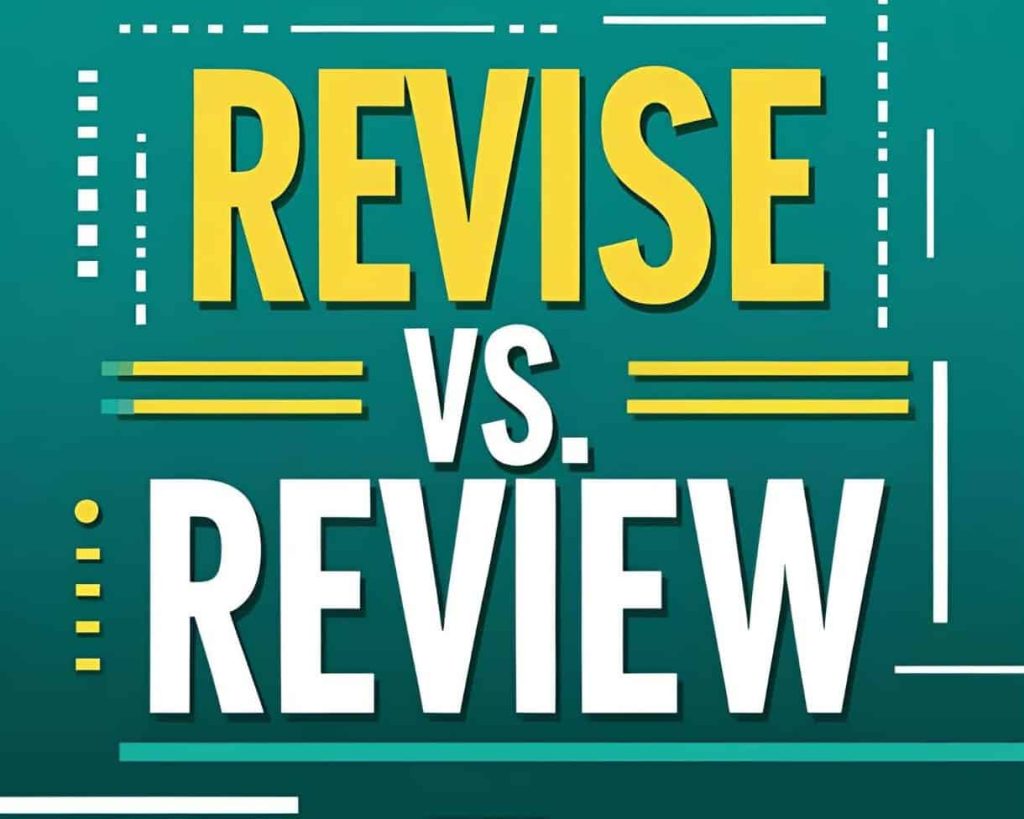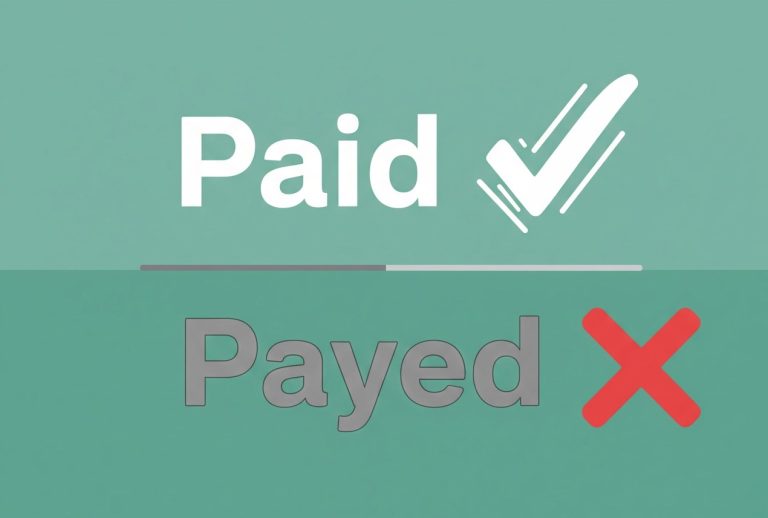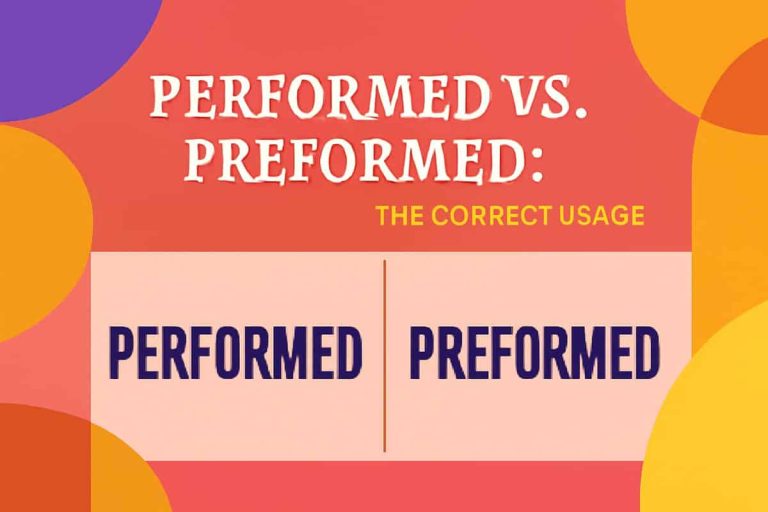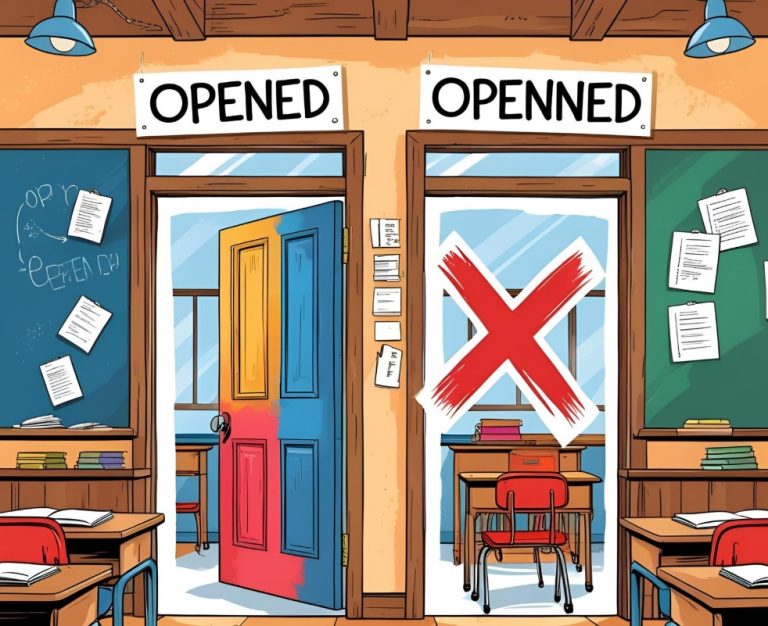Revise vs. Review: Mastering the Nuances of Correction
Understanding the difference between “revise” and “review” is crucial for effective communication and academic success. While both words involve looking at something again, they imply different actions and outcomes.
Confusing them can lead to misinterpretations, especially in writing, editing, and project management. This article will delve into the definitions, usages, and common mistakes associated with “revise” and “review,” providing you with the knowledge and tools to use them correctly.
Whether you’re a student, a professional writer, or simply someone looking to improve their English skills, this guide will help you master these essential terms.
This article is designed to be comprehensive, covering everything from basic definitions to advanced usage scenarios. We will explore the subtle differences in meaning, provide numerous examples, and offer practical exercises to solidify your understanding.
By the end of this article, you’ll be able to confidently distinguish between “revise” and “review” and use them appropriately in any context.
Definitions
Understanding the core definitions of “revise” and “review” is fundamental to using them correctly. While both involve re-examining something, their purposes and outcomes differ significantly.
Revise
To revise means to re-examine and make alterations or improvements to something, typically a written document or plan. The goal of revising is to improve the content, clarity, accuracy, or overall quality of the original work.
Revision involves making substantive changes, such as adding, deleting, reorganizing, or rewriting sections. It’s an iterative process that often involves multiple rounds of adjustments until the desired outcome is achieved. Revision is about making something *better*.
The word “revise” comes from the Latin revisere, meaning “to look at again.” This etymology highlights the core concept of revisiting something with the intention of making improvements. In academic and professional contexts, revision is a critical step in ensuring the quality and effectiveness of written work, presentations, and project plans.
Review
To review means to examine or assess something with the intention of forming an opinion or evaluation. Reviewing typically involves a critical appraisal, where the reviewer considers the strengths and weaknesses of the subject matter.
The purpose of a review is often to provide feedback, identify areas for improvement, or make a judgment about the overall value or effectiveness of something. A review may or may not lead to changes, but it always involves a critical assessment. Review is about *evaluating* something.
The etymology of “review” is also rooted in Latin, from revidere, meaning “to see again.” However, unlike “revise,” the emphasis is on the act of seeing again for the purpose of evaluation, rather than alteration. Reviews are common in various fields, including literature, film, product development, and performance management. They provide valuable insights and help inform decisions.

Structural Breakdown
Understanding the grammatical structure of “revise” and “review” is essential for using them correctly in sentences. Both words can function as verbs and nouns, but their usage varies slightly.
“Revise” as a verb: When used as a verb, “revise” is typically followed by the object being revised. For example: “I need to revise my essay.” It can also be used with adverbs to specify the manner of revision, such as “carefully revise.” The verb “revise” can be used in various tenses (present, past, future) and aspects (simple, continuous, perfect).
“Revise” as a noun: As a noun, “revise” is less common but still used. It typically refers to the act of revising or a revised version of something. For example: “The revise of the manuscript was much improved.”
“Review” as a verb: When used as a verb, “review” is typically followed by the object being reviewed. For example: “The manager will review the report.” It can also be used with adverbs to specify the manner of review, such as “thoroughly review.” Like “revise,” the verb “review” can be used in various tenses and aspects.
“Review” as a noun: As a noun, “review” is more common than “revise.” It typically refers to the act of reviewing or a written assessment. For example: “The book received positive reviews.”
Here’s a table summarizing the structural differences:
| Word | Function | Example |
|---|---|---|
| Revise | Verb | I need to revise my essay. |
| Revise | Noun | The revise of the manuscript was much improved. |
| Review | Verb | The manager will review the report. |
| Review | Noun | The book received positive reviews. |
Types and Categories
Both “revise” and “review” have different types and categories depending on the context in which they are used.
Types of Revision
Content Revision: This involves making changes to the actual substance of the writing, such as adding new information, deleting irrelevant details, or clarifying ambiguous statements. For example, adding more evidence to support a claim in an argumentative essay.
Structural Revision: This focuses on the organization and flow of the writing. It may involve rearranging paragraphs, adding transitions, or improving the overall structure of the piece. For example, reordering the paragraphs in a report to create a more logical sequence.
Stylistic Revision: This involves refining the language and tone of the writing to make it more effective and engaging. It may involve using stronger verbs, varying sentence structure, or eliminating jargon. For example, replacing passive voice constructions with active voice to make the writing more direct.
Copyediting: This is a more detailed level of revision that focuses on correcting errors in grammar, spelling, punctuation, and formatting. It ensures that the writing is polished and professional. For example, correcting a misspelled word or fixing a grammatical error.
Types of Review
Peer Review: This involves having colleagues or peers evaluate your work and provide feedback. It’s a common practice in academic publishing and professional settings. For example, having other students read and critique your research paper.
Literature Review: This is a comprehensive overview of existing research on a particular topic. It summarizes and synthesizes key findings from previous studies. For example, writing a literature review for a dissertation or research proposal.
Product Review: This is an evaluation of a product or service, typically written by a consumer or expert. It provides information about the product’s features, performance, and overall value. For example, reading reviews of a new smartphone before making a purchase.
Performance Review: This is an evaluation of an employee’s job performance, typically conducted by their manager. It provides feedback on their strengths and weaknesses and sets goals for future improvement. For example, having an annual performance review with your supervisor.
System Review: This is an evaluation of a system, such as a computer system or a business process, to identify areas for improvement. It may involve analyzing data, conducting interviews, and observing operations. For example, conducting a system review of a company’s accounting software.
Examples
To better understand the nuances of “revise” and “review,” let’s examine various examples in different contexts.
Examples of “Revise”
The following table provides examples of how “revise” is used in sentences, showcasing its different forms and contexts.
| Sentence | Context |
|---|---|
| I need to revise my essay before submitting it. | Academic writing |
| The author decided to revise the ending of the novel. | Literature |
| Please revise the budget to reflect the new expenses. | Business |
| The software company will revise the program to fix the bugs. | Technology |
| The architect had to revise the blueprints after the client requested changes. | Architecture |
| She spent the afternoon revising her presentation slides. | Business/Presentation |
| He will revise his approach to the problem after the initial failure. | Problem-Solving |
| The committee voted to revise the policy. | Government/Policy |
| They had to revise their travel plans due to the storm. | Travel |
| The chef decided to revise the recipe to make it healthier. | Cooking |
| The editor asked the writer to revise the manuscript. | Publishing |
| The teacher told the students to revise their drafts. | Education |
| The engineer had to revise the design. | Engineering |
| The musician decided to revise the lyrics of the song. | Music |
| The politician promised to revise the law. | Politics |
| The website needs to be revised to be more user-friendly. | Web Development |
| The business plan was revised after the market analysis. | Business Planning |
| The coach asked the team to revise their strategy. | Sports |
| The contract was revised after the negotiations. | Law |
| The instructions were revised for clarity. | Documentation |
| The document was revised multiple times. | General Writing |
| The proposal needs to be revised before submission. | Project Management |
| We must revise our estimates based on new data. | Data Analysis |
| The team will revise the project timeline. | Teamwork |
| The manual has been revised for the latest version. | Technical Writing |
| He revises his notes every evening. | Study Habits |
| She carefully revises her work before presenting it. | Professionalism |
| The report was revised to include more statistics. | Report Writing |
Examples of “Review”
The following table provides examples of how “review” is used in sentences, highlighting its different forms and contexts.
| Sentence | Context |
|---|---|
| I need to review my notes before the exam. | Academic study |
| The critic will review the new movie. | Film criticism |
| The manager will review the employee’s performance. | Human resources |
| The committee will review the proposal. | Decision-making |
| The doctor will review the patient’s medical history. | Healthcare |
| She will review the contract before signing it. | Law |
| He asked his colleague to review his work. | Collaboration |
| The inspector will review the safety procedures. | Safety |
| The board will review the financial statements. | Finance |
| The editor will review the article before publication. | Publishing |
| The students need to review the material covered in class. | Education |
| The government will review the existing laws. | Politics |
| The software developer will review the code. | Software Development |
| The scientist will review the experimental data. | Science |
| The artist will review their previous work. | Art |
| The architect will review the building plans. | Architecture |
| The musician will review the composition. | Music |
| The chef will review the menu. | Cooking |
| The journalist will review the facts before writing the story. | Journalism |
| The investigator will review the evidence. | Investigation |
| The system administrator will review the server logs. | IT Administration |
| The security team will review the surveillance footage. | Security |
| The marketing team will review the campaign results. | Marketing |
| The sales team will review their performance metrics. | Sales |
| The customer service team will review customer feedback. | Customer Service |
| The legal team will review the documents. | Legal |
| The research team will review the literature. | Research |
| The design team will review the prototypes. | Design |
Usage Rules
Applying the correct usage rules for “revise” and “review” is critical for clear and effective communication. These rules govern how the words are used in different contexts and grammatical structures.
Rules for Using “Revise”
- Focus on Improvement: Use “revise” when the primary goal is to improve something by making changes. This often involves editing, rewriting, or reorganizing content.
- Substantive Changes: “Revise” implies more than just superficial changes. It suggests that significant alterations are being made to the original work.
- Iterative Process: Revision is often an iterative process, meaning it may involve multiple rounds of changes and improvements.
- Object-Oriented: When used as a verb, “revise” is typically followed by the object being revised. For example, “Revise the document.”
Example of correct usage: “I need to revise my thesis extensively before the deadline.”
Rules for Using “Review”
- Focus on Evaluation: Use “review” when the primary goal is to evaluate or assess something. This often involves forming an opinion or judgment based on the subject matter.
- Critical Appraisal: “Review” implies a critical appraisal, where the reviewer considers the strengths and weaknesses of the subject matter.
- Feedback Provision: The purpose of a review is often to provide feedback, identify areas for improvement, or make a judgment about the overall value or effectiveness of something.
- Object-Oriented: When used as a verb, “review” is typically followed by the object being reviewed. For example, “Review the proposal.”
Example of correct usage: “The committee will review the applications and select the best candidates.”
Common Mistakes
One of the most common mistakes is interchanging “revise” and “review.” Understanding their distinct meanings helps avoid these errors.
| Incorrect | Correct | Explanation |
|---|---|---|
| I need to review my essay to make changes. | I need to revise my essay to make changes. | “Revise” is appropriate when the goal is to make changes. |
| The critic revised the movie. | The critic reviewed the movie. | “Review” is appropriate when the goal is to evaluate the movie. |
| Please revise the report to give me your opinion. | Please review the report to give me your opinion. | “Review” is appropriate when the goal is to provide an opinion. |
| He reviewed his notes and added new information. | He revised his notes and added new information. | “Revise” is appropriate when the goal is to add new information. |
| Incorrect | Correct | Explanation |
|---|---|---|
| The reviewal of the document is necessary. | The review of the document is necessary. | “Review” is the correct noun form. |
| The revise was well-written. | The revision was well-written. | “Revision” is the correct noun form. |
Practice Exercises
Test your understanding of “revise” and “review” with these practice exercises. Choose the correct word to complete each sentence.
| Question | Answer |
|---|---|
| 1. I need to ______ my presentation before the conference. (revise/review) | revise |
| 2. The editor will ______ the article for publication. (revise/review) | review |
| 3. The team decided to ______ their strategy after the first game. (revise/review) | revise |
| 4. The manager will ______ the employee’s performance annually. (revise/review) | review |
| 5. The author is working on a ______ of his novel. (revise/review) | revision |
| 6. The film critic wrote a glowing ______ of the movie. (revise/review) | review |
| 7. The committee will ______ the proposal carefully. (revise/review) | review |
| 8. The software company needs to ______ its code to fix the bugs. (revise/review) | revise |
| 9. Before submitting the report, please ______ it one last time. (revise/review) | review |
| 10. The teacher asked the students to ______ their essays. (revise/review) | revise |
| Scenario | Answer |
|---|---|
| 1. You need to make changes to a draft document. | Revise |
| 2. You need to give your opinion of a book. | Review |
| 3. You need to improve the clarity of a report. | Revise |
| 4. You need to assess the quality of a product. | Review |
| 5. You need to rewrite sections of an article. | Revise |
| 6. You need to evaluate a colleague’s work. | Review |
| 7. You need to reorganize the chapters of a book. | Revise |
| 8. You need to critique a movie. | Review |
| 9. You need to add more details to a story. | Revise |
| 10. You need to analyze the results of an experiment. | Review |
Advanced Topics
For advanced learners, understanding the nuances of “revise” and “review” in more complex contexts is essential.
Revision Control Systems: In software development, “revision control” refers to systems that manage changes to code over time. These systems allow developers to track revisions, revert to previous versions, and collaborate effectively. Understanding the concept of revision control is crucial for software engineers.
Peer Review Process: The peer review process is a critical component of academic publishing. It involves having experts in the field review research papers before they are published. Understanding the peer review process is essential for researchers and scholars.
Legal Contexts: In legal contexts, “revise” and “review” can have significant implications. For example, a contract may need to be revised to reflect new terms, or a court may review a decision to ensure its legality. Understanding the legal implications of these terms is crucial for lawyers and legal professionals.
FAQ
Here are some frequently asked questions about “revise” and “review.”
What is the main difference between “revise” and “review”?
The main difference is that “revise” means to make changes or improvements, while “review” means to evaluate or assess. Revising aims to improve something, while reviewing aims to form an opinion or provide feedback.
Can I use “revise” and “review” interchangeably?
No, “revise” and “review” should not be used interchangeably because they have different meanings. Using them incorrectly can lead to miscommunication.
Is “revise” only used for writing?
No, while “revise” is commonly used in the context of writing, it can also be used in other contexts where changes or improvements are being made, such as plans, budgets, or strategies.
Is “review” always critical?
While “review” often involves a critical appraisal, it doesn’t always have to be negative. A review can also be positive, highlighting the strengths of something.
What is the difference between “revise” and “edit”?
While both “revise” and “edit” involve making changes to a piece of writing, “revise” typically involves more substantive changes, such as reorganizing content or rewriting sections. “Edit” typically focuses on correcting errors in grammar, spelling, and punctuation.
What is the purpose of a literature review?
The purpose of a literature review is to provide a comprehensive overview of existing research on a particular topic. It summarizes and synthesizes key findings from previous studies and identifies gaps in the research.
How does peer review work in academic publishing?
In academic publishing, peer review involves having experts in the field review research papers before they are published. The reviewers provide feedback on the paper’s quality, originality, and significance. The editor then uses this feedback to decide whether to accept or reject the paper.
What are the benefits of revising my work?
Revising your work can improve its clarity, accuracy, and overall quality. It can also help you identify and correct errors, strengthen your arguments, and make your writing more effective.
Conclusion
Mastering the distinction between “revise” and “review” is essential for clear and effective communication. While both terms involve re-examining something, their purposes differ significantly.
“Revise” focuses on making improvements and changes, while “review” centers on evaluation and assessment. Understanding these nuances is crucial for academic writing, professional communication, and everyday interactions.
By grasping the definitions, usages, and common mistakes associated with these words, you can enhance your language skills and communicate more precisely. Remember to consider the context and your intended purpose when choosing between “revise” and “review.”
With practice and attention to detail, you can confidently use these terms in any situation, leading to more effective and impactful communication.





